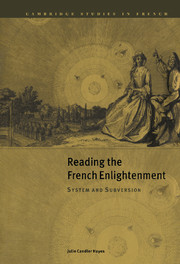Book contents
- Frontmatter
- Contents
- Acknowledgments
- Author's note
- Prologue – despotic Enlightenment
- Introduction – the critique of systematic reason
- Chapter 1 “Système” – origins and itineraries
- Chapter 2 The epistolary machine
- Chapter 3 Physics and figuration in Du Châtelet's Institutions de physique
- Chapter 4 Condillac and the identity of the other
- Chapter 5 Diderot – changing the system
- Conclusion – labyrinths of Enlightenment
- Notes
- Bibliography
- Index
- CAMBRIDGE STUDIES IN FRENCH
Introduction – the critique of systematic reason
Published online by Cambridge University Press: 22 September 2009
- Frontmatter
- Contents
- Acknowledgments
- Author's note
- Prologue – despotic Enlightenment
- Introduction – the critique of systematic reason
- Chapter 1 “Système” – origins and itineraries
- Chapter 2 The epistolary machine
- Chapter 3 Physics and figuration in Du Châtelet's Institutions de physique
- Chapter 4 Condillac and the identity of the other
- Chapter 5 Diderot – changing the system
- Conclusion – labyrinths of Enlightenment
- Notes
- Bibliography
- Index
- CAMBRIDGE STUDIES IN FRENCH
Summary
There have been many narratives of Enlightenment, ranging from euphoric accounts of intellectual courage and progress in the face of superstition and inequality, to dystopian unmaskings of reason's darker motives. In the second half of the twentieth century, from the early Frankfurt School to the work of Michel Foucault, and that of a number of feminist, Marxian and other historicist critics, the analysis of the covert strategies of domination inherent in our “enlightened” institutions cautions us against the liberal tradition's Age of Reason. A major focus for these critiques rests on the classical episteme's drive toward classification and systematization as the discursive space for what Foucault called “disciplines” and “sciences of order.” Although I am not taking issue per se with the work that has been done on the relationship between the purifying of classical reason and certain institutions, and strategies of domination, this intellectual current as a whole reminds me of another interpretative narrative.
The operative “story” is that of the Anti-Oedipe: desire is formless, partitionless, boundless, and “excessive” energy. It is the “un-masking” gesture of the analyst that actually imprints desire, defines its territory, grounds it in a master narrative. Now, according to Jean-François Lyotard (to take but one well-known example), Enlightenment is the source of many of our culture's coercive grands récits. But I will argue here that “systematizing” is energy, unimpeded relationality, movement, emphasizing relations rather than entities, potential rather than fixity.
- Type
- Chapter
- Information
- Reading the French EnlightenmentSystem and Subversion, pp. 3 - 21Publisher: Cambridge University PressPrint publication year: 1999



